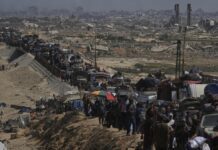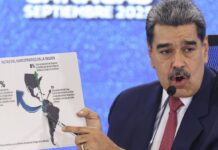
Argentina’s President Javier Milei greets supporters during the closing campaign rally for Manuel Adorni, a contender in the upcoming elections for the Buenos Aires city legislature, in Buenos Aires, Argentina on Wednesday. Rodrigo Abd/AP hide caption
toggle caption
Rodrigo Abd/AP
BUENOS AIRES, Argentina — Argentina’s right-wing President Javier Milei issued a decree on Wednesday curbing immigration to the South American nation, a move coinciding with the immigration restrictions put in place by the Trump administration.

Obituaries
Uruguay’s ex-President José Mujica, nicknamed ‘world’s poorest president,’ dies at 89
In a country that has long prided itself on its openness to immigrants, Milei’s abrupt measures and declaration that newcomers were bringing “chaos and abuse” to Argentina drew criticism from his political opponents and prompted comparisons to U.S. President Donald Trump.
Milei’s government welcomed those parallels to its close American ally, with presidential spokesperson Manuel Adorni saying it was “time to honor our history and make Argentina great again.”
Wednesday’s executive order tightens restrictions on citizenship, requiring immigrants to spend two uninterrupted years in Argentina or make a significant financial investment in the country to secure an Argentine passport.
Immigrants seeking permanent residency must show proof of income or “sufficient means” and have clean criminal records in their home countries.
The decree makes it much easier for the government to deport migrants who enter the country illegally, falsify their immigration documents or commit minor crimes in Argentina. Previously, authorities could only expel or deny entry to a foreigner with a conviction of more than three years.
It also asks the judiciary to fast-track otherwise lengthy immigration court proceedings.

World
U.S. halts cattle imports from Mexico, citing fears of flesh-eating maggot
“For some time now, we’ve had regulations that invite chaos and abuse by many opportunists who are far from coming to this country in an honest way,” Adorni told reporters. The presidential spokesperson is also the main candidate for Milei’s La Libertad Avanza party running in the key Buenos Aires legislative elections Sunday.
In a big shift, the new decree also charges foreigners to access Argentina’s public health care and education while mandating that all travelers to the country hold health insurance. Adorni claimed that public hospitals had spent some $100 million on treating foreigners last year, without offering evidence.
“This measure aims to guarantee the sustainability of the public health system, so that it ceases to be a profit center financed by our citizens,” he said.
Foreign residents from all over the world have been guaranteed free access to Argentina’s extensive education and health systems since a 2003 law under then-President Néstor Kirchner, a left-leaning populist. Public universities and hospitals are now struggling to cope with sharp government spending cuts under Milei’s austerity program.

Politics
Trump calls the U.S.-Canada border an ‘artificial line.’ That’s not entirely true
Right-wing politicians for years have railed against what Adorni described on Wednesday as “health tours,” in which people hop over the border, get treatment and go back home. Already, several northern provinces and the city of Buenos Aires have started charging non-resident foreigners fees to access health care.
Adorni said the decree allows universities to introduce fees for foreign studies if they so choose.
Critics worried that the new rules would challenge Argentina’s tradition of openness written over waves of migration through the decades. Although bursts of xenophobia have prompted crackdowns at various moments of turmoil, Argentina has welcomed surges of foreigners from all over Latin America, the Arab world, Asia and, more recently, Russia, offering a path to citizenship and ensuring their right to basic services.












